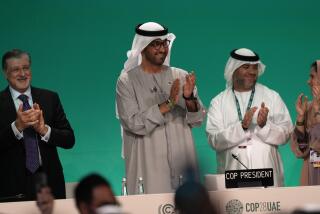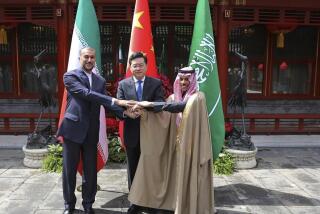OPEC Stops Squabbling, Agrees on Oil Price Boost : $18 Barrel Looms; Iraq Back in Fold
- Share via
VIENNA — OPEC oil ministers resolved a dispute with Saudi Arabia today and signed an oil production quota agreement aimed at boosting prices to $18 a barrel by slashing output and returning Iraq to the cartel’s fold.
“We should see the prices moving up after March or April,” OPEC President Rilwanu Lukman said. “We want it to go up to $18 as soon as possible.”
News of the signing of the accord pushed world oil prices sharply higher. West Texas Intermediate--the U.S. benchmark crude--shot up $1.42 to $15.38 a barrel on the New York Mercantile Exchange. In London, the price of Britain’s benchmark Northsea Brent crude rose by 40 cents to close at $14.55.
Analysts said U.S. consumers could expect to see little immediate increase in gasoline pump prices but they noted prices for both gasoline and home-heating oil could climb by 3 to 5 cents over the next three months if OPEC members cut their output to agreed-on levels and the accord holds up.
The 13 members of the Organization of Petroleum Exporting Countries pledged unanimously to reduce their overall production to a ceiling of 18.5 million barrels a day from a current level of around 22.5 million barrels a day.
Humiliating Saudi Reversal
On the eighth and last day of one of OPEC’s most grueling ministerial meetings ever, powerful Saudi Arabia in a humiliating reversal bowed to pressure from a majority of cartel members and withdrew a last-minute proposal to introduce a $15-a-barrel price floor.
The six-month agreement effective Jan. 1 authorizes the Baghdad government to pump 2.64 million barrels a day, giving it production parity for the first time with its Persian Gulf adversary Iran. Iraq had rejected the OPEC quota system since mid-1986 because Iran refused to cede its position as the cartel’s second-largest producer after Saudi Arabia.
Ministers of 11 countries accepted smaller quotas to allow Iraq parity with Iran.
“We took something from us and gave that to Iraq and finished that once and for all,” said Lukman, who is also Nigeria’s oil minister.
Amine Soussane, an analyst with the London-based trading company Petrogulf International, said he is optimistic that the agreement will hold for some time if not for the whole six-month period.
“It is a whole new ballgame now with Iran and Iraq not in the war any more,” Soussane said. “With those two being disciplined it will lend support to Saudi Arabia’s calls for production maintenance.”
Observing Cease-Fire
Iran and Iraq are observing an Aug. 20 cease-fire that suspended their 8-year-old gulf war.
Iraqi Oil Minister Issam Abdul-Rahim Chalabi said, “Iraq fully intends to stick to its quota.” But Chalabi said he believes OPEC will need a production ceiling above 18.5 million barrels a day to accommodate future production.
Soussane said U.S. oil market reaction to the OPEC agreement is tempered by the large amount of crude stocks already held in oil company inventories.
The final OPEC statement made no reference to the $15 price floor proposed by Saudi Arabian Oil Minister Hisham Nazer on Sunday, shortly after his Iranian counterpart, Gholamreza Aghazadeh, had accepted giving parity to Iraq.
Nazer backed down and accepted reaffirmation of the $18 target price today.
“If people do not want to strengthen the resolution, that is all right with us,” he said.
Saudi King Fahd evidently had sought to keep oil prices low to allow his oil-rich kingdom to market more easily 70 million barrels of crude oil it has stored in tankers waiting near consuming countries.
But ultimately the Saudi monarch did not want to take responsibility for torpedoing an OPEC agreement. Nazer said Saudi Arabia will pursue the idea of a $15 price floor at future OPEC meetings.
More to Read
Sign up for Essential California
The most important California stories and recommendations in your inbox every morning.
You may occasionally receive promotional content from the Los Angeles Times.










